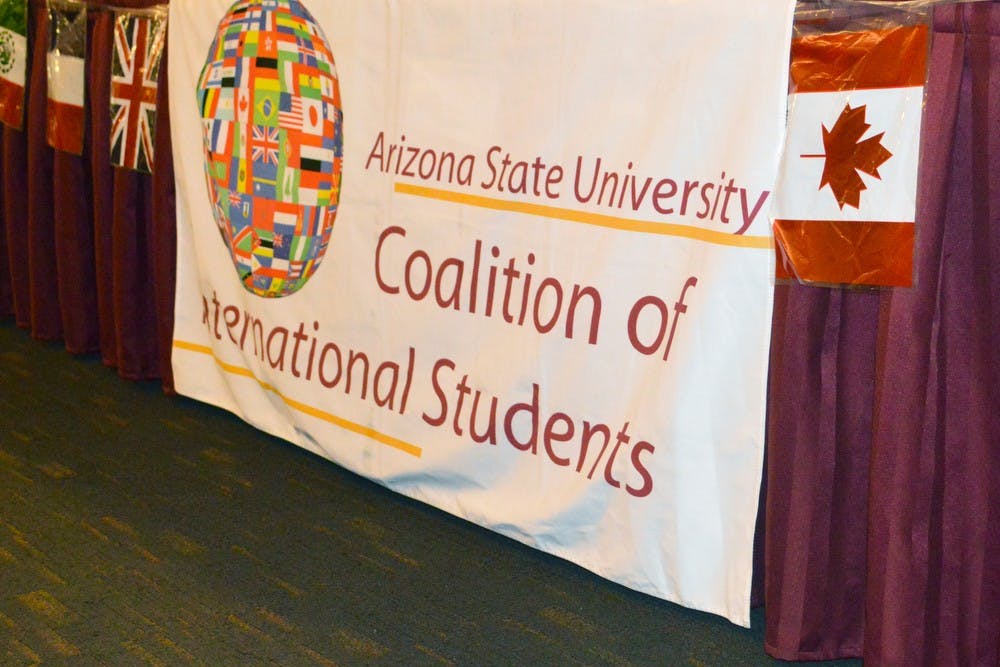Imagine the SAT, with moderators and the cluster of anxious students. It rings a bell in most college student’s heads. But what if that test was in a foreign language?
For international students, it’s not the SAT or the ACT that vexes them, but the TOEFL test, which is an English literacy test used to gauge student’s affinity for the language.
Split between reading, writing, speaking and listening, the test is scored out of 120 points, with 30 points per section.
And much like their standardized counterparts, TOEFL has seen some criticism, especially by some international ASU students.
Take biochemistry sophomore Moses Onyeabor for example. Onyeabor moved to the U.S. from Nigeria in fall 2014. He grew up speaking his native language, Igbo, in his household, but in school he delved into English.
He said he had no problem with the test. However, his past struggle with English and his good grasp on the language showed him where there could be problems.
Onyeabor said communicating with many of the international students was difficult and that a lot of the problems stemmed from how phrased their words and constructed their sentences.
“There are some people who come here and I hear them speak English and I’m just like, ‘What? How did you get this score on the TOEFL?'” Onyeabor said.
Onyeabor said the test was far too heavy on things like vocabulary and writing, and it was less focused on being conversational and more about hitting those academic concepts.
“When I was taking English classes for my first two semesters here, a lot of my friends did not do well,” Onyeabor said. “Not because they’re not smart, they’re very smart, but they cannot communicate so well in English.”
Lois Malone Program Manager of ASU’s sector of Global Launch, said she believes the test is effective in general, but also sees a similar shortcoming.
“A lot of times departments find students are very good at academic English,” Malone said. “They’re fantastic at writing papers, but they can’t engage with other students in their group and in their class.
Global Launch works with those students who struggle with English and don’t meet the TOEFL standards set by the University. Students admitted to the program generally have a strong GPA and application, but lack English skills so they’re conditionally admitted to the University.
Students in the program take not-for-credit English classes to develop their skills. However, Malone said many international students bypass Global Launch because they have the minimum TOEFL score, so they immediately go into classes.
She’s found that professors talk to them and say that students, while they have the bare academic knowledge, they don’t have that cultural knowledge to interact and work with their peers.
Because ASU’s test has a minimum admission score of 61/120, or around 50 percent, many foreign students don't get the help they need in developing their English.
ASU, compared to most universities has one of the lowest TOEFL requirements. While there are certainly ones with lower scores like Oregon State University with 53, more competitive schools like Northwestern University have a requirement of 111.
Chemical engineering sophomore Limon Bogere said he found that ASU still holds fairly low admission standards.
Bogere came to the U.S. from Uganda in fall 2014 like Onyeabor. He grew up speaking his native language, Lusoga, with a mixture of English and Luganda spoken by his teachers.
Even though he grew up with a little bit of introduction to the language, he was still sick and unable to focus on the language to the best of his ability when he took the TOEFL test.
“I was just like, ‘I just want to finish, I want to be done with this test,’" he said. "I got a score above that of ASU, but I missed out on some other universities because I was two points below their TOEFL cutoffs.”
So he entered ASU, and fell into the programs at the school, but found that a lot of the class placements of his peers didn’t match their skills.
“Students may be placed in a lower class based on the TOEFL that doesn’t best (fit) them, it doesn’t give them any challenge,” Bogere said.
Bogere said he believes an emphasis should be placed on the listening section as opposed to the reading.
Onyeabor suggested making the test more interactive through interviews over Skype or video. It would be time consuming, but he said it would add that human connection.
“It’s important to be talking with the person directly to kind of to see more of an idea, getting a better understanding of them,” Onyeabor said.
Related Links:
SAT changes but students still suffer
2012 SAT scores reflect steady failure of education system
Reach the reporter at megan.janetsky@asu.edu or follow @meganjanetsky on Twitter.
Like The State Press on Facebook and follow @statepress on Twitter.




